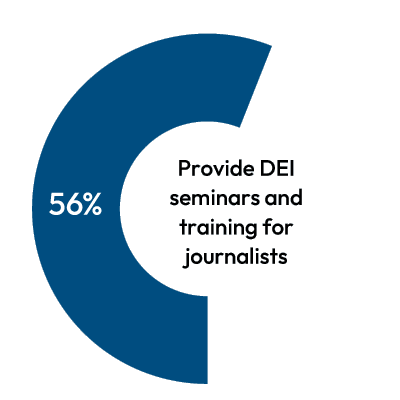This study is a snapshot of the Asian media environment in 2021. It aims to provide an Asian perspective to diversity, equity and inclusion (DEI) in the news media industry in order to design relevant tools and programs for advancing DEI in the region’s newsrooms and news coverage.
SCOPE
7 Asia Pacific markets
Hong Kong, Indonesia, Japan, Philippines, South Korea, Singapore, Taiwan
5 languages
Research conducted in Chinese, English, Indonesian, Japanese and Korean
1000+ journalists, 198 companies
1226 media professionals representing 198 media companies responded to the survey
+ additional research
- 9 focus groups involving 44 journalists from 38 media organizations
- 9 interviews with news executives
- 14 Asia diversity stories written by ANDA Diversity Reporting fellows
Survey Respondents




Key findings
Diversity is an Asian value
The survey reveals a strong endorsement among Asia Pacific journalists that diversity, equity and inclusion are core journalism values.
Respondents agree or strongly agree on the value of diversity:



Equity is a value entrenched in Asia’s newsrooms
Questions about equity in the ANDA survey show that it is a value solidly entrenched in Asia’s news industry.
Percentage of Asia’s journalists agreeing or strongly agreeing that:



Job satisfaction and talent retention are closely linked to DEI indicators
Journalists who said they would remain in their news organizations for as long as they could rated their news organizations higher in diversity, equity and inclusion.
Journalists intending to resign gave lower DEI ratings to their work environment.
Diversity in Asia embraces a wide array of issues beyond gender or ethnicity
According to the journalists who participated in the ANDA project’s focus group discussions:
Diversity is the acknowledgement and representation of the multitude of identities and experiences that include, but are not limited to, race, ethnicity, indigenous identity, gender, sexual orientation, age, citizenship status, language, education, socioeconomic circumstances, geographical location, ability/disability, criminal record, religion, mental health, and political views.
Class and gender are considered the most important diversity issues.
Ethnicity and religion are less important
Percentage of survey respondents that consider the following issues as important or very important for the news media to focus on:




Diversity priorities differ in each market
The top two diversity issues differed in each market, with respondents outlining what they considered the most important for news media to focus on.
HONG KONG
Age + Social Class
Indonesia
Race + Disabilities
JAPAN
Social Class + Immigrants
Philippines
Mental Illness + Social Class
Singapore
Mental Illness, Disabilities + Immigrants
South Korea
Social Class + Gender
Taiwan
Age + Gender
Read all about this and more in our
48-page ANDA report (PDF, 4.4 MB).
Mental illness, disabilities and sexual orientation also deserve a stronger focus in Asia’s news media
We asked journalists how often in the last year they had worked on news about groups of people. The least covered groups included those with mental illnesses, disabilities, and different sexual orientations.
Proportion of respondents who never or only occasionally reported in the past year on:



Asia’s newsrooms are not exempt from discrimination
Proportion of journalists who reported they often or very often encountered – whether this was at their workplace or from sources or newsmakers – someone making an insensitive or disparaging comment about:

Sexual harassment of women journalists is prevalent
56%
of female respondents reported receiving sexist remarks or sexual innuendos at their
news outlet.
41%
of female respondents said they had received unwanted physical contact from sources or
newsmakers.
Journalists are particularly exposed on social media platforms
Asia’s journalists are regularly exposed to discrimination and harassment online.
76%
of journalists have received derogatory comments on social media.
53%
of journalists reported receiving derogatory comments by email.
Main barriers to DEI
Journalists cited barriers to diversity, equity and inclusion (DEI) in news reporting.
Percentage of survey respondents agreeing or strongly agreeing that:



Best ways to improve DEI in Asia’s newsrooms
Percentage of Asia’s journalists who say these solutions would be very or extremely effective to improve DEI in their newsrooms:



Fill out form to order your free copy of the ANDA report now



